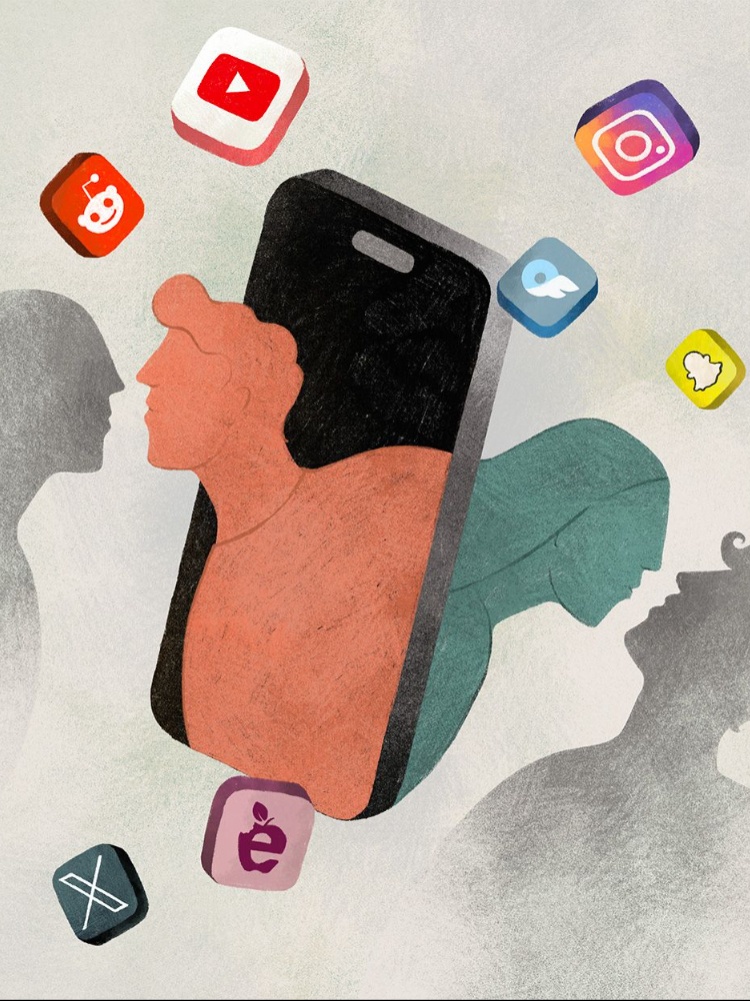“Do you know how excited I am that Valentine’s Day falls on a work day?” Dhiraj, a chartered accountant from Mumbai, asks with a coy smile. “She thinks I will be in office but I’ve already taken leave. Crystal and I are spending the day together on video call.” In case you’re wondering, the ‘she’ in question is Dhiraj’s wife and Crystal is the woman from Singapore that he’s currently dating—the two have never met, and never plan to.
Crystal and Dhiraj found each other on the subred r/OnlineAffairs, a designated space for married redditors on the lookout for a “discreet online relationship”. If your mouth fell open, may we add, there are 129k members in this community and Reddit is chock full of similar NSFW subreds like r/Adultery, r/Affair or r/NaughtyfromNeglect. Dhiraj (who prefers to go by his first name, like the others interviewed in this story) explains his reason for stepping out on his wife of four years: “I’m not unhappy in my marriage but I’m not happy either, this is an in-between.”
A pretty weak argument but the CA is among a growing crop of people who are cheating on their partners with someone they met on the internet. And if you’re even remotely online, you’ve probably been swarmed with stories of celebrities and normies straying. At the end of 2024, Saltburn’s enfant terrible Barry Keoghan allegedly cheated on pop queen Sabrina Carpenter with OnlyFans creator Breckie Hill. A couple years ago, resident nice guy Adam Levine broke hearts when his flirty DMs with (many) models and influencers were unearthed online. Even on Instagram and YouTube, countless young creators make GRWM videos where they share debilitating personal experiences with infidelity, and it’s likely that you’ve heard of at least one such tale IRL (sorry!!!).
While adultery is as old as marriage itself, the noise around cheating seems louder than ever. The obvious answer is that social media allows rapid proliferation of these narratives, making every victim and villain a microcelebrity with millions of views. But what’s more pertinent is recognising the role that the internet plays in enabling and evolving the way that people cheat. You don’t have to read between the lines to know that Snapchat is the easiest way to send spicy nudes without leaving a trace. Today, apps are bolder in their branding: Gleeden, a French app with 3 million users in India, calls itself the world’s largest platform for extramarital relationships.
Although Gleeden entered India in 2017, it has grown by a shocking 270 per cent in 2024 with Bengaluru leading as the infidelity capital of the country (the state has the most number of users on Gleeden). Something about having an affair online, shrouded and contained on your phone, far away from your lived experience, makes it feel less consequential. This is further legitimised when you see that thousands of others are doing the same, as if to say, cheating is so normal that there is an accessible app for it, you know, just like there’s one to order groceries. Counselling psychologist Anushka Chhajed agrees, “Deindividuation is a well-known psychological phenomenon where people, when part of a group, feel less personally responsible for their actions. This reduces the guilt of getting involved in these platforms because you think ‘it’s not that bad’.”
This exact sentiment dissuades Delhi-based Kavita from believing that she is doing anything wrong by using Gleeden. The 28-year-old housewife feels sexually unfulfilled in her marriage and has expressed this qualm to her husband but to no avail. Six months ago, she joined the app and is happy to report that all her “fantasies and wild dreams are coming true.” Kavita adds, “I don’t feel guilty because I only sext people. I draw the line at meeting them in person and I don’t even say I love you.”
For years, people have defined infidelity under the banners of physical or emotional. But the digital landscape blurs these boundaries with nebulous situations. Even if you slot Kavita’s online exchanges as cheating, what would you say about following creators online who are popular for posting naked photos? If you’re okay with the following, what about liking or better yet, commenting on them? This line gets muddier when you bring in OnlyFans, Patreon or live camera porn, where users can set up one-on-one calls with creators and even make custom requests, without ever seeing them offline.
These hazy actions that could be seen as adultery by one but not by another are often called micro-cheating or soft-cheating, and are most common in the postdigital era. Sonali, a chef from Bengaluru, recently walked in on her long term boyfriend stripping down while on video call with an OnlyFans creator. “Apparently OnlyFans payments don’t go through easily in India so users find each other on other platforms like Twitter,” she says. “I watch porn and I know he does too but this live video call crossed a line for me. He still insists it was not cheating.”
Although Sonali and her partner communicated about digital intimacy and porn, they didn’t anticipate how video calls or live interactions would be perceived. As technology advances, people are bound to encounter fresh new ways of infidelity: does sexting with an AI bot count? Often in the internet era, we are still working out where our boundaries lie as they are being crossed. It is, unfortunately, not a one-size fits all, sliding into someone’s DMs could be okay for you and a dealbreaker for someone else.
As a precursor, Chhajed suggests looking at how the action would make your partner feel. “Instead of labelling behaviours as universally right or wrong, couples could ask if the action may feel disrespectful. Would you feel comfortable if the roles were reversed? Are you trying to hide the action?” In real time, these quick self check-ins could help you assess how your partner may react and whether the act in question could be seen as cheating.
In case you’re craving a deeper conversation and want to establish some ground rules for dating safely in the digital age, Chhajed leaves us with a string of questions to dive into with your partner. An unconventional Valentine’s Day date idea, but you’re welcome.
- Are we comfortable with each other’s social media presence and engagement?
- At what point does online engagement (DMs, likes, follows, videos) feel disrespectful?
- Do my digital habits add to or take away from the intimacy we share?
- How can we use technology to strengthen our relationship rather than create distance?
- How do we handle personal privacy vs. transparency in our relationship? Is sharing passwords necessary or is trust enough?
- What should we do if one of us starts feeling uncomfortable about digital interactions?



